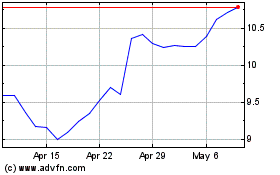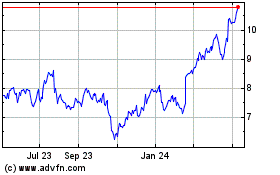IMF Raises U.K. Growth Forecast
October 04 2016 - 10:00AM
Dow Jones News
LONDON—The International Monetary Fund on Tuesday raised its
estimate for U.K. growth this year, but marked down its forecast
for 2017, saying uncertainty about the country's future ties to the
European Union are likely to weigh on the British economy for some
time to come.
Britons voted in June to leave the EU and the U.K. Prime
Minister on Sunday said she plans to notify the EU of Britain's
formal exit from the EU by March, a move that will begin divorce
talks expected to last at least two years.
The pound on Tuesday fell to a three-decade low against the
dollar, losing 0.82% to reach $1.274. The pound was trading lower
against the euro at €1.141, down 0.4%.
The IMF on Tuesday said in its regular World Economic Outlook
that it expects the U.K. to grow 1.8% in 2016 and 1.1% next
year.
The new forecast for 2017 is slightly lower than one the fund
had made in July, in the aftermath of Britain's June vote to leave
the EU, and sharply lower than it was predicting earlier in the
year. The fund in July forecast U.K. growth of 1.7% this year and
1.3% in 2017. Before June's referendum on EU membership, the fund
had penciled in growth of 1.9% in 2016 and 2.2% in 2017.
The improvement in the fund's 2016 forecast reflects a run of
better-than-expected economic data in the U.K. that suggests the
economy has weathered the surprise referendum result well. A survey
of managers in the construction sector, published Tuesday by
financial information firm IHS Markit Ltd., recorded the first
expansion in activity in September for four months. The services
and manufacturing sectors posted healthy growth over the summer,
according to official data. A preliminary estimate of third-quarter
growth will be published later this month.
But, in common with the Bank of England and many economists, the
IMF said it expects the economy to slow in 2017 as uncertainty over
the U.K.'s EU ties depress consumer spending as well as business
investment and hiring. It said the subdued growth it expects next
year assumes the coming exit talks proceed smoothly, and it urged
the government to respond to any slowdown with growth-friendly
tax-and-spending policies if needed.
The changes to the IMF's forecasts echo those of London-based
economists, many of whom were expecting a sharp slowdown in the
immediate aftermath of the vote.
Of 15 economists at financial institutions polled by The Wall
Street Journal, 13, including staff at Barclays, Citigroup, Goldman
Sachs and Morgan Stanley, have in recent weeks raised their 2016
economic-growth predictions compared with their forecasts in July
and August. The survey showed that economists now expect the U.K.
to grow by 1.8% this year, the same rate expected before the
referendum.
Those surveyed have also upped their expectations for next year.
Those which in the immediate aftermath of the vote predicted that
the U.K. economy would shrink next year, including Barclays and
Credit Suisse, have now revised their forecasts, penciling in
modest expansion or no growth instead.
However, the surveyed economists still see U.K. gross domestic
product taking a substantial hit next year. They now predict an
expansion of just 0.7% in 2017, compared with pre-referendum
expectations of 2.1% growth.
Beyond 2017, the IMF said it anticipates the U.K. will grow more
slowly than it would have done had it remained an EU member. The
fund said it expects medium-term growth of around 1.9% a year,
against a pre-referendum forecast of 2.1%.
The downgrade in the U.K.'s growth potential reflects
"impediments to trade, migration and capital flows" that the fund
expects will accompany the U.K.'s EU exit. Proponents of quitting
the EU say the U.K. will flourish outside the EU, where it will be
free to ink new trade deals for goods and services with old allies
such as the U.S. and Australia, as well as faster-growing parts of
the world in Asia.
In a separate report, the IMF said an U.K. exit from the EU
poses challenges for the stability of the U.K. financial system.
Banks could face higher operating costs if they lost their
automatic right to sell services across the 29-member bloc, the IMF
said, while foreign investment into the country could decline,
hurting the price of real estate and other assets.
Write to Jason Douglas at jason.douglas@wsj.com and Wiktor Szary
at Wiktor.Szary@wsj.com
(END) Dow Jones Newswires
October 04, 2016 09:45 ET (13:45 GMT)
Copyright (c) 2016 Dow Jones & Company, Inc.
Barclays (NYSE:BCS)
Historical Stock Chart
From Mar 2024 to Apr 2024

Barclays (NYSE:BCS)
Historical Stock Chart
From Apr 2023 to Apr 2024
